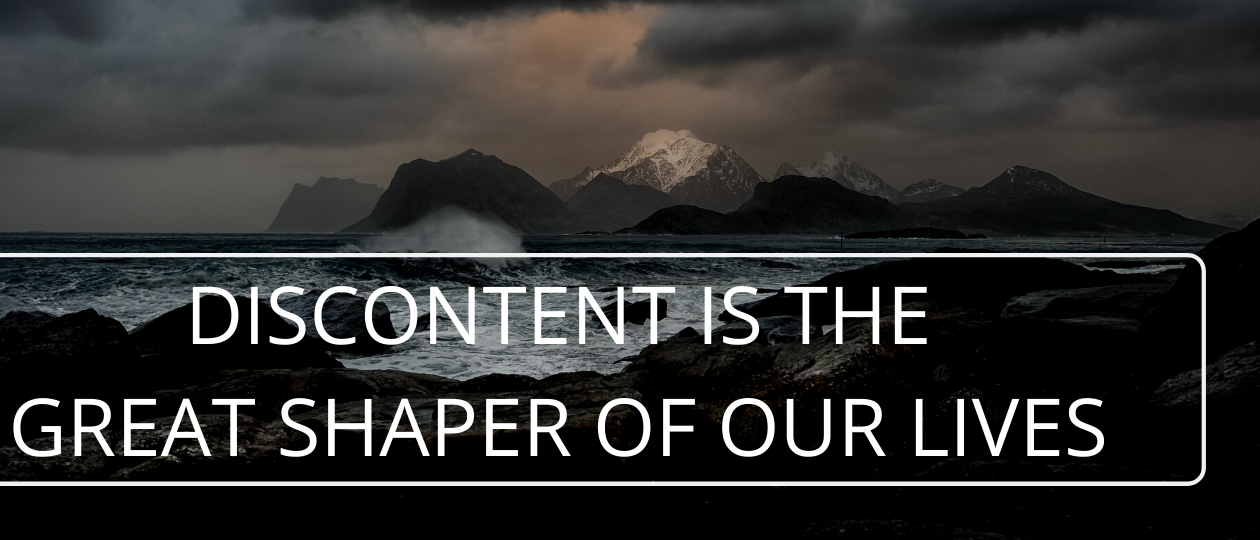Discontent is the Great Shaper of Our Lives
Categories:
Jesus BlogsOur title today comes from a piece of my son’s writing. Harry has a gift for philosophy, and in particular for taking deep spiritual truths and condensing them into just a couple of lines. I recently asked him to write something for me related to a teaching I wanted to do, and this is what he came up with:
“Discontent is the great shaper of lives, for good or ill—and it is guided not by actions or circumstances but by intent. Intent determines the direction in which we grow and discontent, the restless aspiration, provides the resistance required to build spiritual muscle.”
Wow, there’s a lot to unpack there, but let’s just start with intent. Another way you could think of intent is “what’s in your heart.” Are you trying to live for love, putting relationships and other people first, or for your own pain/pleasure programming? Ancient manuscripts point out that God, and only God, looks at the heart, while the rest of us can only judge actions. However, we can get a sense of what’s in our own heart, and it’s absolutely true that the nature of what’s there will determine the general direction of our lives.
So we have intent, which gives us our direction, and the driving force being directed is discontent. We even have a definition for that term: restless aspiration. Most of us, when we hear the word “discontent,” think of it in a negative connotation. It’s a form of pain, after all, being unsatisfied with the current state of things. But as we’ve discussed before, pain is actually necessary for living our best lives. If we let it, pain is a teacher that gives us the chance to improve ourselves. And note the word “aspiration.” This kind of discontent isn’t purely pain; it includes hope as well—a belief that things can be better than they are.
Strangely, once you’re able to internalize this philosophy of seeing pain and discontent as a guide and a source of strength, you can find a kind of contentment—what might be better called “peace”—even in the midst of discontent.
Over the past few weeks, we’ve discussed our list of necessities for a great life. Things like faith, belief, choice, justice, truth, time, and pain, which are all necessary for a life of full, meaningful love to be possible. Pain and choice are especially important here. You might say that choice is yet another word for intent, the direction we give to whatever life we have. Pain makes the choice meaningful if we let it, but it also makes the choice difficult.
In fact, we tend to fight against pretty much everything on that list from time to time. Truth, for instance, requires us to be willing to question our own beliefs, even those that we’ve built our whole life around. That can be scary, and most likely, all of you have some experience of seeing someone persist in believing something that was obviously wrong because they didn’t want to face up to that. Most likely, you’ve done it yourself about something, big or small.
So what does that mean in practical terms? Well, it leads us back to a simple truth—that improving our lives and ourselves takes work. Resistance is built into the process because the process wouldn’t be possible without it. But even though willpower alone is not enough, the intention to continue onward despite hardships is the one thing you can’t teach and on which everything else depends.
Think about it another way. You may have heard the expression, “stop learning, start dying.” Human beings are wired to work and to seek improvement. You can see this in numerous studies on the elderly, which have found that those who retire just to putter around the house and watch TV tend to quickly grow sick and die. Meanwhile, those that keep working on something they’re passionate about, whether that is a career or a hobby, usually live long and mostly healthy lives. What would life be like if it could never get any better?
This is where the second part of discontent comes in—the “aspiration” part of the restless aspiration. Discontent inherently means believing that things can be better, and this creates the opportunity for hope. Depending on how you choose to react to it, discontent can be a source of despair or of great joy. Now for some of you out there, you may be burdened down by so much hurt and trauma that it takes away that choice. But that’s what our tools are for. It really all comes down to that one thing: giving you back your ability to choose. And every single day is a new choice.
Have a blessed, wonderful day!
Alex Loyd




Add a Comment